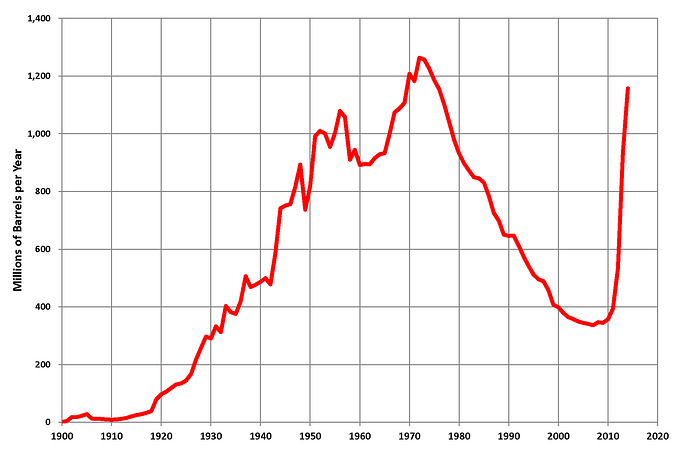pdaly,
This Wikipedia article (https://en.wikipedia.org/wiki/List_of_countries_by_proven_oil_reserves) claims that there are approximately 1.5 trillion barrels of proven petroleum reserves. The world currently uses about 30 billion barrels of petroleum per year. If we don't find any more and if we don't increase our usage, we've got about 50 years of proven reserves left. 1.5 trillion barrels is about 56 cubic miles. Assuming we've used about half of all the earth's oil endowment, we originally had around 115 cubic miles of petroleum.
This Wikipedia article (https://en.wikipedia.org/wiki/List_of_lakes_by_volume) shows Lake Erie (the 18th largest lake by volume) having a volume of 120 cubic miles. Assuming that the estimates are off by a factor of 2, Lake Titicaca in Bolivia/Peru is 15th on the list at 214 cubic miles. Instead of OCEANS, you should be thinking the equivalent of LAKES. That is still a mind boggling amount for most folks.
Unfortunately (or fortunately,) our oil reserves aren't all contained in an easy-to-pump lake. It is distributed in underground pockets of various sizes. The big pockets (super giant oil fields) have lots of interconnecting pockets in a porous substrate (think of a limestone cave as an illustrative example.) The super giants are the easiest to discover and produce the highest EROEI (energy returned on energy invested.) Ghawar in Saudi Arabia is the biggest super giant oil field ever discovered. One estimate had 170 billion barrels originally in place (about 6 1/2 cubic miles of petroleum which is still a good sized lake. The rest are all smaller.) That is about 6 years of current production in a single field. It was discovered in 1948 and has been commercially pumped since 1951. To enhance production, Aramco pumps millions of gallons of sea water per day into the field. Oil is less dense than sea water, so sea water fills the lowest levels of the reservoirs and forces the oil to the upper levels to be pumped out. (Aren't humans clever?)
Because we've literally explored all over the earth already, and we've used all the knowledge obtained by exploring to concentrate efforts in likely locations, the chances of finding another super giant are exceedingly slim. I'd be surprised to hear that another giant oil field was discovered.
M. King Hubbard was a geoscientist who worked for Shell Oil. In the 1950s, he noticed that every petroleum field in existence went through a similar pattern of increasing oil production until about half the recoverable oil was extracted. Then, the fields became increasingly stingy and went into long term decline. In other words, it peaked its production. Using statistical analysis, he proposed that the US (which was the lower 48 at the time) would peak in the early 1970s and begin the long slow decline. That continued until recently when fracking was discovered and implemented rapidly to tight oil formations. (Aren't humans clever?) The graphic shows Texas production, but total US production is similar.
https://en.wikipedia.org/wiki/Peak_oil#/media/File:Texas_Oil_Production_1935-2012.png
Note the peak of production in the early 1970s and the long decline until the mid 2000s decade. Then, around 2010, production increased in hockey stick fashion. Why is that? The only thing that changed was widespread fracking of tight oil formations. This was suddenly seen as profitable as the price of petroleum went up. Petroleum prices peaked in '08, plummeted in '09, then rose again to a plateau from '11 to '14, and since then have plummeted again.
Fracking needs high petroleum prices to be profitable. It is unknown how many operations are profitable at these relatively low prices. Fortunately, the federal reserve has kept borrowing rates suppressed since '09. That drives down all interest rates - including junk bonds. As a result, frackers are able to access cheaper funding to maintain operations. They have to pump as much as they can to get enough money to make payments on their operations and existing debt. It doesn't matter if they are profitable at current prices. If they don't pump to capacity, they go under.
So, is this current day miracle of expanded oil production and cheaper pump prices sustainable? It may be for a while, but eventually geologic limits will announce themselves. there are economic limits in play as well. Fracking needs high oil prices to be profitable (think of that as the floor of a room.) The economy needs low oil prices to maintain itself and actually grow (think of that as the ceiling of a room.) As long as the ceiling is above the floor, there is room for commerce to continue. When oil is too expensive for the consumer or too cheap for the producer, we've got a problem. Can producers make a profit at current prices? Can the economy handle oil prices over $100/barrel? Something has got to give.
Enjoy these low prices while they last. Use them to prepare for the inevitable time when prices increase again. That's my advice.
Grover

